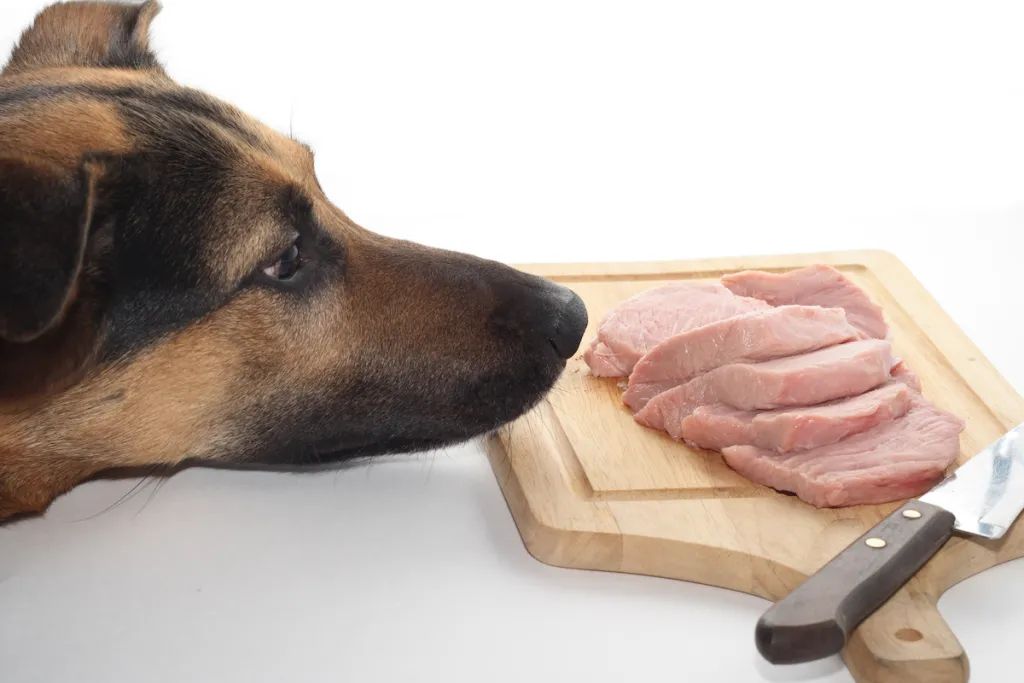Unlocking the Culinary Choices for Canine companions: Exploring the Pros and Cons of Pork Consumption for Dogs
– Pork Nutrition and Digestibility for Dogs
Pork Nutrition and Digestibility for Dogs
Pork is a good source of protein, fat, and vitamins. It is also a relatively digestible protein source for dogs, making it a good option for dogs with sensitive stomachs. Here is a table that compares the nutritional value of pork to other common protein sources for dogs:
| Nutrient | Pork | Chicken | Beef |
|—|—|—|—|
| Protein (%) | 19.4 | 20.7 | 18.9 |
| Fat (%) | 14.2 | 15.4 | 12.5 |
| Carbohydrates (%) | 0.6 | 0.8 | 0.6 |
| Fiber (%) | 0.3 | 0.3 | 0.2 |
| Vitamins A | 20 IU | 15 IU | 10 IU |
| Vitamins B | 1.2 mg | 1.1 mg | 1.0 mg |
| Vitamins C | 1.0 mg | 0.9 mg | 0.8 mg |
| Minerals Iron | 2.4 mg | 2.2 mg | 2.1 mg |
| Minerals Calcium | 10 mg | 12 mg | 11 mg |
| minerals Phosphorus | 90 mg | 95 mg | 85 mg |
– Potential Health Concerns and Allergies
Potential Health Concerns and Allergies
While pork may not be toxic to dogs in small amounts, raw pork can carry parasites like trichinae that can lead to nausea, vomiting, and abdominal pain. Additionally, pork products, especially processed meats like bacon or sausage, can contain high levels of salt, fat, and preservatives that are unhealthy for both dogs and humans. Some dogs may also be allergic to pork,which can manifest with skin irritation,digestive issues,or respiratory problems.If your dog is experiencing any of these symptoms after consuming pork, it’s crucial to consult a veterinarian promptly.
– Ensuring a Safe and Balanced Diet
Striking the right Balance: Ensuring a Safe and Balanced Diet
While pork can offer some nutritional value,it’s crucial to note that it’s not the most ideal meat for dogs. Just because pork is a common human food doesn’t mean it’s a perfect fit for canine nutrition. Always ensure to check with your veterinarian before giving your dog any type of human food. They can evaluate your dog’s individual needs and provide specific recommendations to ensure a balanced diet that promotes thier health and well-being.
- Conclusion: Weighing the Pros and cons
Weighing the Pros and Cons
Ultimately, there is no straightforward answer to whether or not dogs can eat pork. While it may be a good source of protein, it can also come with risks. Owners must carefully consider the following advantages and disadvantages:
Pros:
Rich in protein: Pork provides essential amino acids for muscle growth and repair. Source of vitamin B: Pork is a good source of riboflavin, niacin, and vitamin B12, which are crucial for metabolism and cell function.
Contains zinc: Pork is a good source of zinc, which supports immune function and skin health.
Cons:
High in fat: Pork can be high in fat, which can lead to obesity, pancreatitis, and other health problems.
May contain parasites: Raw or undercooked pork may contain parasites, such as Trichinella, which can cause illness in dogs.
Can cause an allergic reaction: Some dogs may be allergic to pork, leading to symptoms such as itching, hives, or swelling.
In Summary
In the realm of canine cuisine, the question of pork consumption lingers, a culinary conundrum that stirs curiosity and sparks debate. While dogs are often perceived as opportunistic carnivores, their dietary needs are vastly different from our own.Understanding the complexities of doggy digestion can help us make informed choices about what our furry friends should and shouldn’t eat, ensuring their health and well-being.


Leave a Reply